Now let's cover the Ukrainian geography. First, as we can see, Ukraine is a very flat country. It has mountains only in the very west, in Carpathians, and in the very south, on the southern cost of Crimea. The rest of the country is flat as a pancake. What does it mean? 🧵 
Well, geography-wise most of Ukraine is a part of the Eurasian Steppe. The Steppe stretches continuously from the Altai mountains to the Carpathians, with an exclave in Hungary. That's why Ukraine historically lied straight on the way of nomads, migrating from Asia westward 
When talking of nomads we recall Mongols, Turks, Magyars. And yet, nearly all Europeans might be descendants of an ancient nomadic wave - the Indo-Europeans. Indo-Europeans probably belonged to the Yamnaya culture, which originated in Ukrainian steppes and then conquered Europe 
Indo-European conquest was extremely violent, far surpassing whatever waves that came later. Pre-Indo-European cultures designated as the Early European Farmers seem to be wiped out almost completely. Now pre-conquest cultures remain only in the mountains of Pyrenees and Caucasus 
These nomadic waves were a constant of Ukrainian history till the 18th c. Another factor to be considered were rivers. Looking at the map of Ukraine we might think it possesses uniquely good network of natural communications. So many rivers and all flowing to the World Ocean 
Unlike Russia for example. As you see, Central Russia where the Muscovite state originated, belongs to the endorheic basin of the Caspian Sea. Smaller rivers flow into Volga, Volga flows into Caspian and from Caspian, well, we aren't getting anywhere. No connection with the ocean 
And yet, it's not that simple. Although Ukraine has tons of rivers flowing into the World Ocean, they were covered with rapids. That's for example how Dnieper, the Ukrainian largest river used to look like till 1930s. Nine large rapids obstructed the navigation 
You had to unload your boats, put them and all the goods on your backs and carry all of this past the rapid. Repeat nine times for all nine rapids. That's how Byzantine emperor Constantine Porphyrogenitus described Dnieper navigation in his treatise De Administrando Imperio 
Rapids were also clear points of failure. Consider the death of Kyivan Prince Svyatoslav. In 927 he was returning to Kyiv, having plundered Bulgaria & Byzantium. On a rapid he was ambushed and killed by the nomad Pechenegs. They knew he 100% must disembark here with all the loot 
That's why Cossacks who would play such an important role in the Ukrainian history were called Zaporozhye (= behind the rapids) Cossacks. River communications with southern lands which lied downstream of the rapids were obstructed and thus a lawless pirate republic emerged there 
The problem was solved in 1932 with the construction of the Dnieper Hydroelectric Dam. Who stands in front of it? Its Chief Engineer Hugh Lincoln Cooper, a Colonel of the US Army Corps of Engineers. Stalin's industrialisation would be impossible without massive American support 
A third factor to consider is the appendix of Crimea. Crimea's relatively isolated from the mainland and its mountains gave protection from the north. That's why Crimea was the area best connected with the Mediterranean economy and a home for various vanishing cultures 
First southern Crimea was subject to the Greek colonisation. Then it became a centre of the Bosporos Kingdom competing with the Romans. With the defeat of Mithridates Eupator by Pompey, it falls under the power of Rome 

In the Middle Ages Southern Crimea becomes a part of the Genoese commercial empire. Deep purple here - are territories under the direct Genoese control, most importantly Caffa. There were also competing Venetian colonies in Crimea, but they were less important 
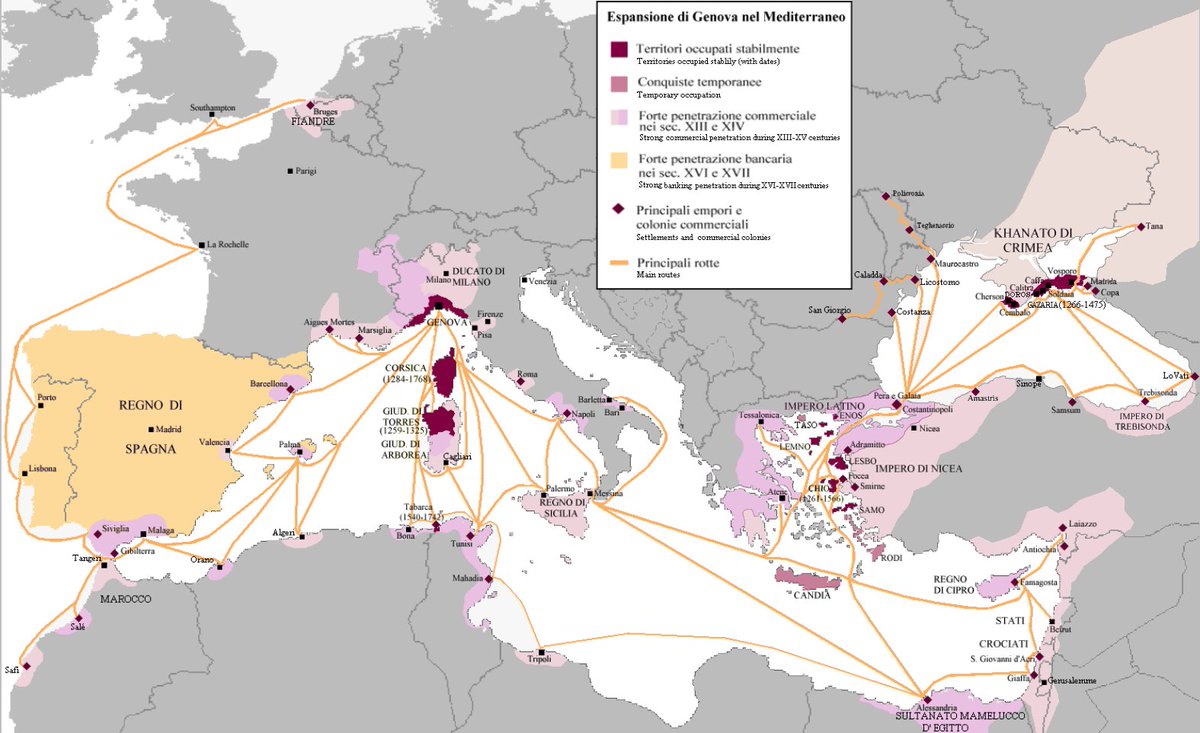
What did the Italians import from Crimea? Well, slaves mostly. Italians were buying tons of slaves to supply Italy, Spain and most importantly Italian sugar plantations in the Mediterranean. See a nice paper on the Russian slaves and captives in the Crown of Aragon, XIV-XV cc 

Egyptian sultans bought so many Turkic slaves for their army, that they overthrew them and made their own Mamluk Dynasty which controlled Egypt till 19th c. Sultan Baibars, defeater of Mongols and Crusaders, built a mosque in Crimean town where he was sold to slavery as a child 
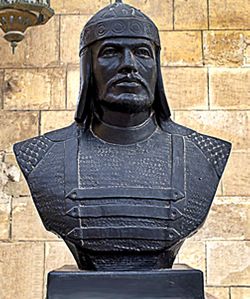
Vibrant urban culture of Crimea and certain protection it gave, allowed many old cultures to survive for very long. For example, the Gothic language, extinct elsewhere, reportedly survived in Crimea till 1530s
There was also the Armeno-Kipchak language. Crimea had all kinds of languages and cultures - Greeks, Italians, Armenians, Jews, etc. They still held their religion. However, by the 16th c they all switched to the language of the ethnic majority - the Kipchak (=Tatar)
The Armeno-Kipchak language was the Kipchak language but written with the Armenian letters. It is quite common for many minorities who lose their language but keep the script (see Belarussian Arabic Alphabet). In Polish-held Lviv Armenian diaspora printed books in Armeno-Kipchak
Much of former diversity waned in the 18th c. In 1778 Russia deported Christian population of Crimea north. Why? For two reasons. First of all, Crimea was not annexed yet, it was contested between Russia and Turkey. Many in St Petersburg believed Russia couldn't really hold it
Thus the best course of action would be - just take the 'useful' and assimilatable part of population, the Christians, and move them into the Russian heartland. Thus Russia gets new loyal subjects and taxpayers, while dispossessing the Crimean Khanate of the taxpayers
Secondly, the official Russian discourse implied that Crimean Christians are suffering under the Muslim power of the Khanate. So Christian co-believers must be liberated from their chains. That's why in 1778 Russia ordered to deport Christians north
How did Christians react? Some submitted and went north to unpopulated Donbass, and suffered huge mortality from cold and famine. Others tried to hide. Fieldmarshal Rumyantsev got so many complaints that he eventually prohibited General Suvorov to use force for making them move
Suvorov later recalled 'Fortunately this order was issued only after the deportation was completed. Otherwise I would suffer for failing to organise the removal'
While some Crimean Christians accepted the deportation or tried to hide, others simply converted to Islam to avoid it. Paradoxically, mass Islamization was a result of the Russian conquest. That's very similar to what happened on Volga in 17-18th c - I'll certainly cover it later
But once Russia decided it wants Crimea, it now started cleansing it from the Muslims. In the 19th c Crimean Tatars were pushed to leave Crimea en masse, especially after the Crimean War. Alexander II wrote that he wants Crimea to be cleansed from this 'harmful population'
By 1900 Crimea was known for tourism, specifically for female sex tourism. Upper class women travelled here and hired Tatar guides. Stereotypically this came with benefits. See Chekhov's 'Tipping Tongue': an official's wife describes to her husband a vacation she had in Crimea 
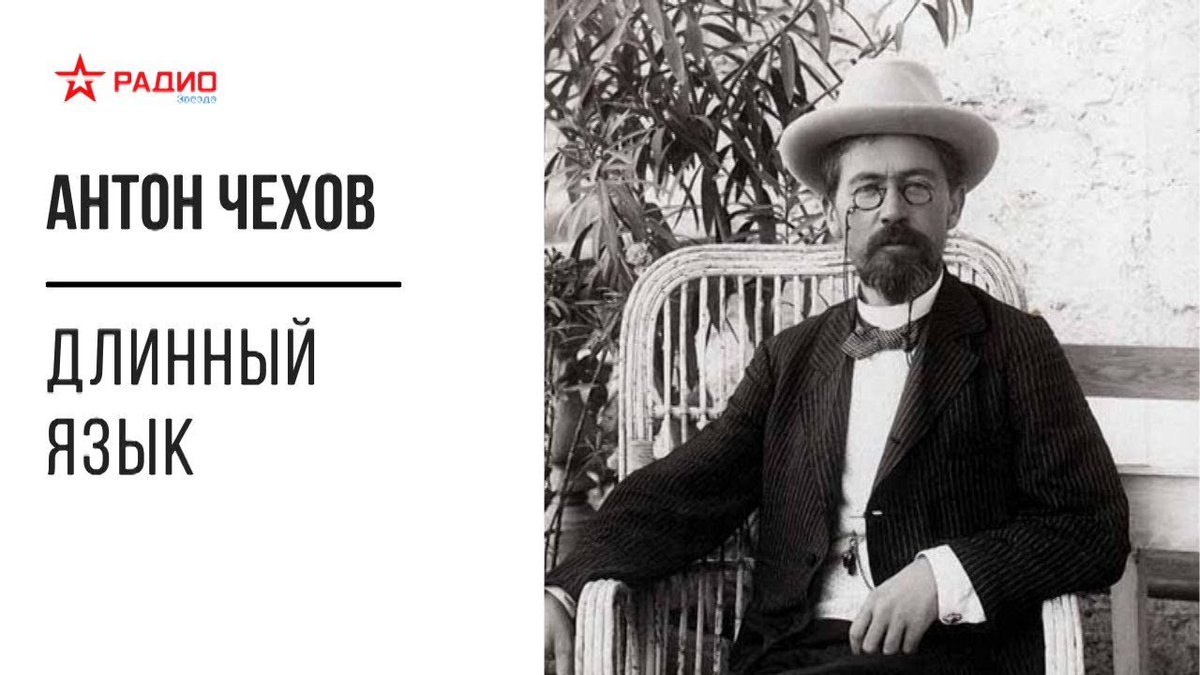
Now let's talk of East Vs West. The divide is very clear and shown on pretty much any electoral map. If you want a short and simple explanation it would be: West Ukraine is Old Country, East Ukraine is New Country 

That means that the West is a zone of very old and continuous agrarian settlement and urban life. Meanwhile in the East even the agrarian settlement, let alone urban life were very very discontinuous. Why? Once again - it is a part of the Eurasian Steppe 

Early Kipchak towns of what is now Eastern Ukraine were destroyed by the Mongols. Later, in Golden Horde era, the Silk Road went through the region. As a result vibrant towns emerged in what is now Donbass. All destroyed by the Tamerlane around y 1400 

Therefore, whereas the West was a zone of farming and of urban life, the East stood barren. Any towns that emerged there were destroyed by new waves of conquerors - and there could be no defense on this open plain
That's not to say the West didn't have problems. It had many. In early modern period it was subject to the agrarian overpopulation. The grain export to Europe brought the second serfdom upon its population: it now had to produce enough gran so that landlords could export it
And yet the West had uninterrupted tradition which the East didn't have it often had no tradition at all, much of it being colonised only under the Russian Empire. Consider two irredentist region which are now contested by Russia - Donetsk and Ligansk. How did they develop? 
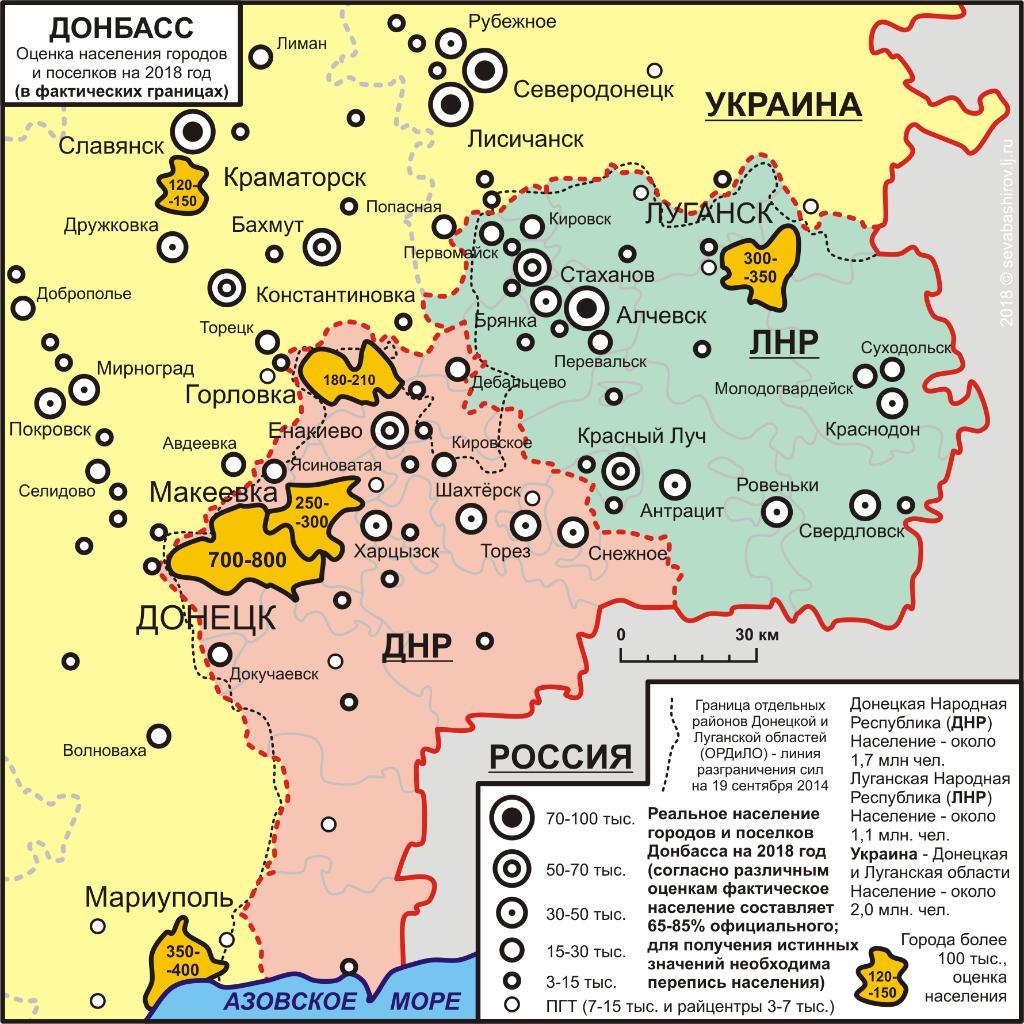
Luhansk was founded by the British industrialist Charles Gascoigne. Gascoigne was an inventor and producer of carronades - naval artillery that largely determined the success of the Royal Navy in Napoleonic Wars. In 1770s he moved to Russia and established a number of foundries 

And yet, he had a problem: Russian metallurgy worked on charcoal. Gascoigne needed real coal. He travelled extensively looking for its deposits until he found them in what is now Luhansk. In 1795 Gascoigne established here a foundry which would become a nucleus of the future city 

Donetsk too was built by a British industrialist - now by a Welshman John Hughes. In 1869 established a plant in these sparsely inhabited lands. A settlement that grew around this plant was called after him - Yuzovka. In 1924 it was renamed to Stalino, and in 1961 - to Donetsk 

Donbass doesn't really have pre-industrial tradition or even pre-industrial population. This land was developed and populated very recently with heavy involvement of Western capital and expertise. Thus it emerged as the industrial heartland of Russian empire and then of the USSR 
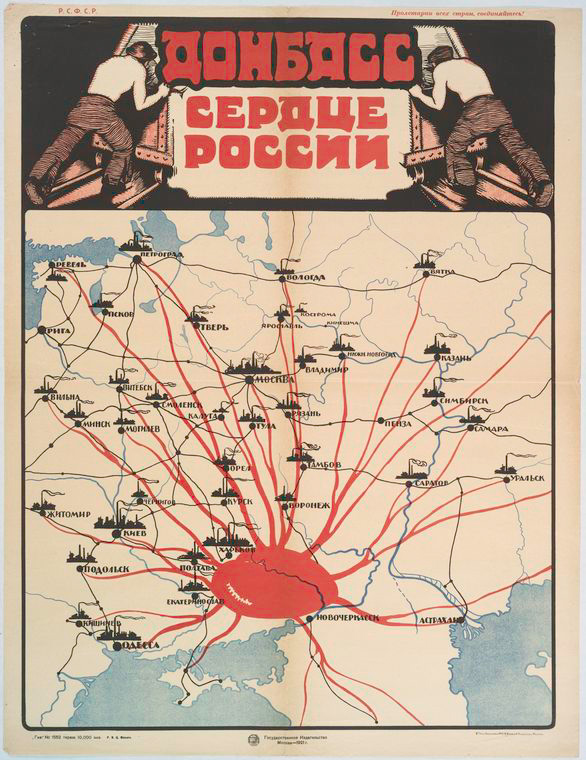
This heavy industry largely determined the socio-economic landscape of Donbass. In the Soviet times foreign-owned plants were nationalised and became government property. They were greatly expanded with the expertise of American engineers and slave labour of Stalin's prisoners 

And what happened with them in the 1990s? Well, they were all appropriated by the mafia. That's a dirty secret of both Russian and Ukrainian privatisation: they both gave the most valuable assets, producing tradable goods, in the hands of the organised crime 

Mafia is an economic structure and it needs economic basis to develop properly. Westerners and Soviets built the Donbass industry which in the 1990s was acquired by the organised crime for almost free. Thus Donbass mafia clans became the strongest and most influential in Ukraine 

While Western Ukraine has its own organised crime, it lacks the economic basis to support the mafia of the Donbass scale and power. The West simply didn't have that much Soviet industry to loot. Thus Donbass mafia clans largely determined the political landscape of the country
President Yanukovich ousted in 2014 was the representative of the Donbass mafia which controlled this region. Loss of Yanukovich was their loss. That's why they eagerly supported Russian irredentism in Donbass, thus triggering the processes they couldn't quite control. End of 🧵 

• • •
Missing some Tweet in this thread? You can try to
force a refresh







